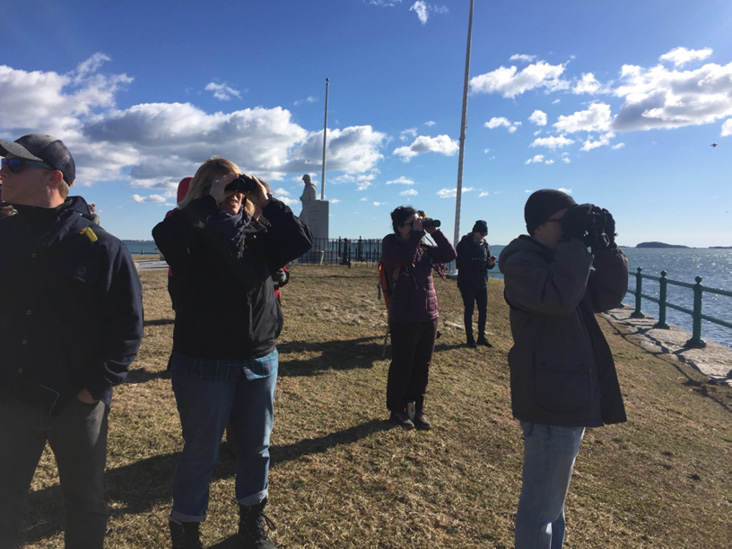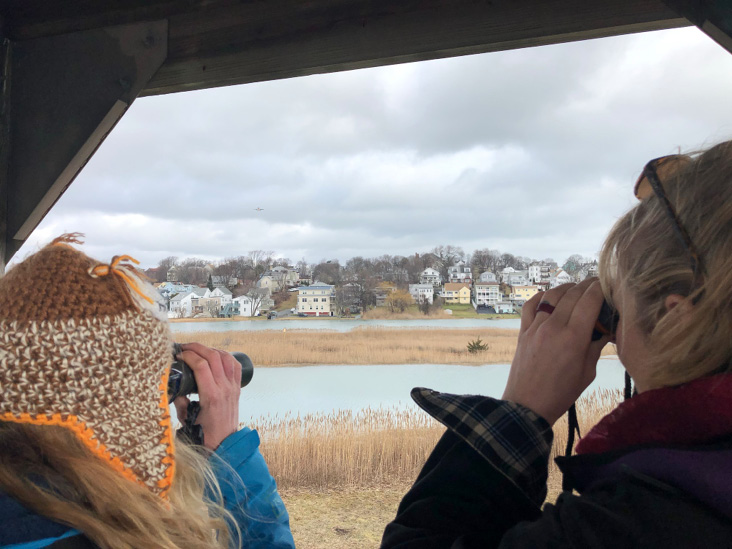Karla Noboa

Participants in the Feminist Bird Club at Castle Island. Photograph by Megan Billman.
The Feminist Bird Club was started in October of 2016 by Molly Adams, when she piqued her friends’ interest in what she was doing on the outskirts of NYC during fall migration. When a female jogger was murdered in Queens near a hot spot where Molly would often go birding solo, she felt compelled to create a group in which all birders could support one another in a welcoming and safe environment. The mission of the Feminist Bird Club is to promote diversity in birding and provide a safe opportunity to connect with the natural world in urban environments while fund-raising to protect the rights of women, members of the LGBTQ+ community, and people of color. It quickly attracted others and the Feminist Bird Club was born.
The Feminist Bird Club Boston chapter began in 2017 when I wanted to learn more about birding but found the birding world to be intimidating and overwhelming. I felt out of place and as an education outreach professional, I wanted to do something about my situation that could benefit others as well. I wanted to create a space where anyone felt welcome and excited to explore an interest in birds and the natural sciences.
According to the latest U.S. Fish and Wildlife survey, 93 percent of self-identified birders are white and only eight percent of self-identified birders are African American.
As birding becomes more popular among more diverse groups in the United States, a mindful, inclusive space becomes more necessary. As someone who had very little birding experience, I felt uncomfortable asking questions among the dozen people that seemed to know everything and weren’t keen to slow down. As a first-generation American, I felt even more out of place in what seemed like an entirely white community.
Now in its second year, the Boston chapter of Feminist Bird Club has grown in popularity. Our walks have an average of 15 attendees and each walk welcomes around 50 percent new members and 50 percent returning members. We have many members whose first time birding was with the Feminist Bird Club, and now they come back every month. We also have biologists who are expert birders and regularly attend walks to help everyone else see new and exciting things.
The Boston chapter aims to make birding and the natural sciences as accessible as possible; walks are always hosted in areas that are accessible by public transportation and in greater Boston. It is often easy to forget that nature is all around us, even in urban areas, so I hope to bring more awareness to the species that live right in the city. Our favorite locations for urban birding are the common ones: Mount Auburn Cemetery, the Arnold Arboretum, and more. In 2019, we hope to expand beyond only offering walks and partner more with local urban communities to raise awareness for accessibility in the sciences, as well as feminist and human rights causes.
I often am asked what the word “feminist” has to do with birding and this club. Besides discussing feminist issues during walks, the very existence of the Feminist Bird Club is a form of advocacy for the rights of women, the LGBTQ+ community, and people of color by making all of these groups more visible in the birding world. The members of the club participate in fund-raising for feminist and other causes by purchasing an annual bird patch created by the club to support a human rights organization, and have also raised funds for the New York Abortion Access Fund, Black Lives Matter, and this year, Pueblos Sin Fronteras and Native Youth Sexual Health Network.
Birding can be a very intensive, time consuming hobby. For some, the goal is to see as many birds as they possibly can during their lifetime, chasing rarities and attempting big years. For others, birding is casual; it is the time they spend seated by the bird feeders, or a way to get outside and be mindful as they experience nature.
For me, birding is a form of active meditation. As someone with anxiety that fluctuates from minimal to debilitating, birding is how I get my mind to slow down and be present. Three years ago, when I bought my first pair of binoculars, I realized that birding was the most accessible outdoor activity available. It was something I could do anywhere, from mountain trails to the middle of a major city. All I needed to do was slow down and look.
If you would like to be a part of the Feminist Bird Club, please join our mailing list to learn about walks and events. If you can’t attend walks in Boston, you can still be involved; anyone anywhere can be a member! Find some interested friends or neighbors, get together as a group of Feminist birders, and have fun! More information can be found online at molly-adams.com/feminist-bird-club. Additionally, if you are interested in helping lead walks, organize events or would like to be more involved in the Boston chapter, please reach out! We are looking for extra hands.

Participants in the Feminist Bird Club at Belle Isle Marsh. Photograph by the author.
Some people are very competitive in their birding. Maybe they’ll die happy, having seen a thousand species before they die, but I’ll die happy knowing I’ve spent all that quiet time being present. (Thomson, 2014)
Reference
- Thomson, L. 2014. Birding with Yeats: A Memoir. Toronto, Ontario: House of Anansi Press.
Karla Noboa is the coordinator of the Boston chapter of Feminist Bird Club. When not running FBC, she manages volunteers and programs for the Esplanade Association, and volunteers for Mass Audubon and the Arnold Arboretum. With a degree in Natural Resources, Karla aims to diversify and increase access in the field of natural sciences, and create a passion for ecology and conservation in everyone.